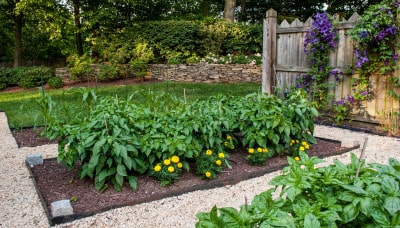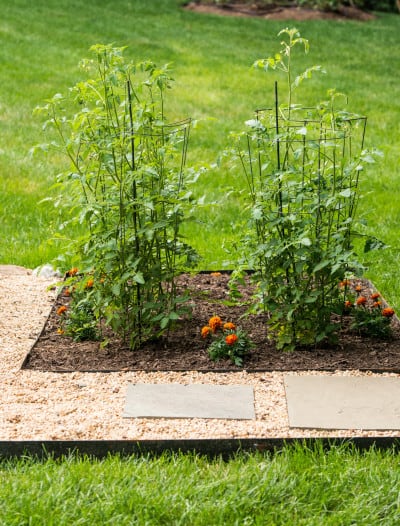Did you know that you can plant annual flowers within your vegetable garden?
For so long, gardeners have kept the two separate. It used to be that vegetable gardens were placed in a back corner of the yard, out of sight, while annual flowerbeds occupied the high profile locations. This is no longer the case! Plants are breaking out of their typical roles and growing together harmoniously.  With increased awareness of the benefits of growing your own produce, many are adding in vegetable plants to their flowerbeds and seeing the rewards firsthand. The practice of companion planting isn’t a new concept. Companion planting is the close planting of different plants that enhance each others growth or protect each other from pests. Farmers have long incorporated this practice with their crops.
With increased awareness of the benefits of growing your own produce, many are adding in vegetable plants to their flowerbeds and seeing the rewards firsthand. The practice of companion planting isn’t a new concept. Companion planting is the close planting of different plants that enhance each others growth or protect each other from pests. Farmers have long incorporated this practice with their crops.
Some of the most common combinations are:
Basil, parsley, & tomatoes
Beets, cabbage, lettuce, radishes, & carrots
Melons, corn, pumpkins, radishes, & squash
By using this concept of companion planting, gardeners are finding what annual flowers work best within their gardens.
Two of our favorite annuals to incorporate into vegetable gardens are:
Marigolds
The bright yellow blooms are good at attracting bees and butterflies.  These insects are outstanding pollinators and essential for the health of your garden. The strong scent from Marigolds can confuse pests when inter-planted with vegetables. Marigolds are also great at deterring beetles.
These insects are outstanding pollinators and essential for the health of your garden. The strong scent from Marigolds can confuse pests when inter-planted with vegetables. Marigolds are also great at deterring beetles.
Nasturtiums
This red, yellow, and orange colored flower is well know for attracting aphids. This might not seem like a good reason to grow them near your garden, but having them planted could deter and distract aphids from your tomatoes, peppers, beans, strawberries, and cabbage. Like Marigolds, they are great at attracting butterflies, a necessary pollinator.
So, as you plan out your summer garden, you should strongly consider what combination of annuals and vegetables will work for you. You should have fun with it and experiment with different combinations. We have planted a couple different combinations within our personal container gardens and are really excited to watch them grow. Vegetable gardens don’t have to occupy a large space of your yard. You can easily have a couple planter boxes and still reap the rewards of a full sized garden! The benefits of container gardening are really endless, but we will save that for another post!